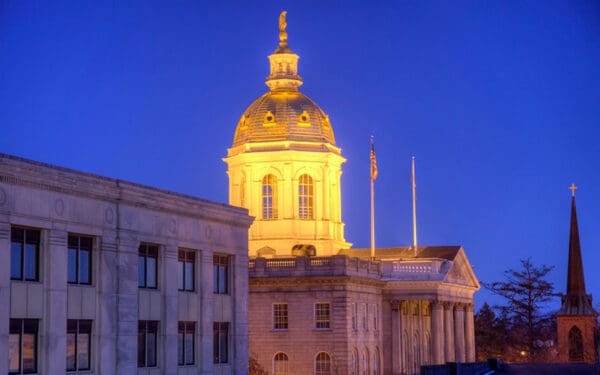
Plastic and other single-use packaging is creating a pollution and recycling crisis in Maine and across New England. Photo: Dvorakova Veronika via Shutterstock
Two years ago, China stopped accepting our paper and plastic for recycling unless it was perfectly sorted and uncontaminated, triggering a recycling crisis in this country. As we open 2020, one thing is clear: that crisis is not improving.
The effects of China’s decision have been staggering. Towns like Kennebunkport and Bradley, Maine, canceled their recycling programs when old contracts expired and new ones raised costs exponentially. Augusta was forced to reduce its recycling centers from four to two. In New Hampshire, increased costs to Hooksett and Franklin caused those towns to cancel their programs entirely. And in western Massachusetts, a block of 101 towns and cities recently faced a major swing from positive revenue to budget deficit under a new recycling contract with that state’s Department of Environmental Protection, which they had to sign by January 31.
We’ve explained before that taxpayers like you and me should not be responsible for this mess. Instead, the producers of extraneous, mixed, unrecyclable paper and plastic packaging must manage their waste – and its cost. As legislative sessions start up around the region, we are partnering with other environmental organizations to do just that by reforming our recycling system, starting in Maine.
Maine Is Leading the Way to Better Recycling
Waste management companies and producers like Coca-Cola have been quick to blame the current crisis on poor consumer recycling habits (in other words, they claim that it’s our fault, not theirs). But here’s the real reason our recycling costs have soared: So much of our paper and plastic packaging is not designed to be sorted easily, or even recycled, in the first place. Producers push throw-away products onto the market with no thought towards whether or not they can be recycled or reused, leaving consumers confused and taxpayers holding the massive bill.
Maine legislators are working to change that math by shifting recycling costs back where they belong: onto the producers of this unmanageable packaging. In May of last year, Governor Mills signed a bill that required the Maine Department of Environmental Protection (DEP) to draft first-of-its-kind legislation creating producer responsibility for packaging.
We worked closely with the state agency, as well as other environmental advocates and municipal and industry stakeholders, to craft that bill. Early last month, the DEP delivered a draft to the Maine Legislature.
If the Legislature passes this groundbreaking legislation, here’s what will change:
- Producers (think: large name-brand companies) will pay into a fund used to reimburse Maine’s towns and cities for the cost to recycle or dispose of the millions of tons of cardboard, plastic, glass, metal, and mixed packaging sold in the state each year.
- Producers of packaging that won’t get recycled, like polystyrene containers and mixed-material packaging, will pay more into the program because disposing of their packaging costs more.
- Producers whose packaging is easily recyclable or who use recycled content will pay less.
- Producers whose packaging is reusable or refillable will pay the least.
Ultimately, the commonsense idea here is to make companies evaluate their packaging upfront – before it’s actually used for a product, instead of after, when it becomes a burden for our recycling system. That, in turn, will incentivize those companies to redesign their packaging so it’s easily recyclable (or to rethink their packaging altogether).
The Rest of New England Is Right Behind
Maine’s city and town leaders have emerged as the driving force behind producer responsibility for packaging in the state. Through dedicated outreach, our partners at the Natural Resources Council of Maine have rallied more than 16 communities into vocal support for the bill and collected 1,400 signatures from residents.
But recycling costs and plastic pollution are not unique to Maine. Lawmakers in other New England states also are responding to the recycling crisis with producer-funded programs. In Massachusetts, we have worked closely with Rep. Michael Day (D – 31st Middlesex) on a bill that would create a similar program to Maine’s. And, in Vermont, a bill passed over the summer mandated a stakeholder group form to discuss plastic pollution – a central topic of conversation was the passage of producer responsibility for packaging legislation.
What We Can Learn from Our Northern Neighbors
Packaging companies may not want to take responsibility for their waste, but they aren’t strangers to these programs. Countries around the world, including European Union members, Israel, Russia, and five Canadian provinces, require the same companies selling packaging in the U.S. to manage their waste.
Maine’s northern neighbor, Quebec, has successfully operated a similar program since 2005. Through the program, 1,100 Quebecois communities are reimbursed $250 million each year, which helps to offset the cost of their recycling programs. As a result, 63% of the packaging sold on the market is recovered and recycled. That’s more than twice the amount recovered and recycled as in the U.S., where recycling rates for packaging hover around 25% on average.
Best of all, Quebec residents have not seen their product costs go up. Packaging companies, which combined rake in $10 billion in profits in the province each year, spend less than a penny per package on the recycling program.
The Tide Is Turning on Plastic Pollution
In 2019, several New England states joined others around the country in banning single-use plastic items like bags and polystyrene, and in requiring straws upon request. But bans alone won’t solve our plastic crisis – they certainly won’t ease the soaring costs of recycling for towns and cities, and they won’t clean up our ailing ocean.
Meanwhile, industry is running out of excuses for its inertia. If packaging producers don’t act, then we will do it for them. We must implement systemic solutions that make those companies generating waste feel the cost in their bottom lines. Only then will they reconsider their polluting products.
If adopted, Maine’s producer responsibility legislation would be the first in the country. Maine and our region have a chance to lead the rest of the U.S. into a new era of sustainability. Now we have to take it.



